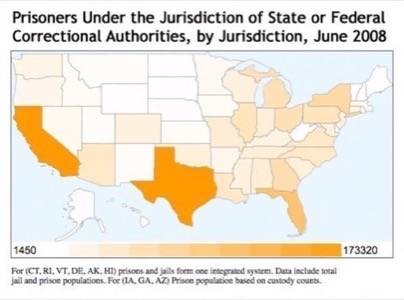Public data from the government – is it an opportunity for innovation and essential accountability or a snoozer that no one really cares about? Government transparency advocacy group The Sunlight Foundation offers one example today of something that can be done with government data that is clearly worth doing – but the data they used hasn’t been made available on the Obama administration’s anemic new data repository Data.gov.

Virginia Senator, Jim Webb, has a bill going through hearings that would create a National Commission to study and make recommendations on the reform of US criminal justice laws and practices. Twenty eight other Senators have signed on in support of the bill, but cross referenced statistics shed some interesting light on those Senators still standing on the sidelines.

Sunlight downloaded a CSV list of prison populations in all 50 US states and created a map to visualize which states have the largest prisoner populations. Cross reference those numbers with the list of supporters who have singed on to the National Prison Commission Bill and what do you see? Surprise, surprise, not a single Senator from the three states with the biggest prison populations (California, Texas and Florida) are excited to see the the current criminal justice system studied and reformed.
That disinterest could be a matter of economics or satisfaction with the status quo. Or the aversion to studying the matter may represent a desire to avoid embarrassment. The explanation can’t be drawn from the data, but it is good data to have. It’s not data that Data.gov will help you get your hands on. That catalog of public data remains limited to some of the least controversial data sets online. Three weeks after it’s launched, Data.gov keeps adding more and more data sets to its collection – but a search for the word “prison” still brings up zero results.
Take a country with the highest documented incarceration rate and total documented prison population in the world, where under-represented ethnic groups are incarcerated multiple times more than the dominate majority population. Isn’t that the kind of situation where you’d like to know whether or not a politician supports just studying the matter? Who does and who doesn’t? Easy access to government and public data can help shed important light on current events like this and that’s why people get excited about calls to open data up to the public in better and better ways.

















